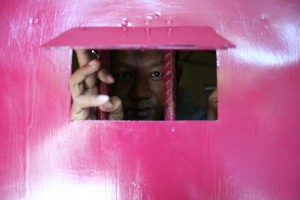A prominent human rights group has called into question President Thein Sein’s recent commitment to clear Burma’s jails of prisoners of conscience by the end of the year, with a human rights activist jailed in Rakhine State the same day the announcement was made.
 The Assistance Association for Political Prisoners in Burma issued a statement calling for the President’s words are not enough and it needs “concrete action towards emptying Burma’s prisons of all political prisoners and ensuring no one is arrested for their political beliefs or activities.”
The Assistance Association for Political Prisoners in Burma issued a statement calling for the President’s words are not enough and it needs “concrete action towards emptying Burma’s prisons of all political prisoners and ensuring no one is arrested for their political beliefs or activities.”
AAPP acknowledge President Thein Sein’s sentiments, and speech but said they did not go far enough.
“But words are not enough – the hundreds of political prisoners still behind bars and the thousands who have been conditionally released need action.”
On the same day President Thein Sein made his pledge to delegates at a conference in London, police in Burma’s Rakhine state detained a 74-year-old Rohingya human rights activist.
“The government continues to rely on repressive laws to silence dissent and jail peaceful protesters in Myanmar,” said Amy Smith, Amnesty International’s Burma researcher. “For there to be lasting change in the country, these practices need to be stopped and the laws need to be brought in line with international standards.”
During a speech at the independent policy institute Chatham House in London on 15 July 2013, President Thein Sein said.
“I guarantee to you that by the end of this year, there will be no prisoners of conscience in Burma.”
President Thein Sein also stated that all cases are being reviewed through a committee established by the government earlier this year “to ensure that no one remains in prison due to his or her political beliefs.”
But Amnesty International is skeptical.
“We’ll be looking to President Thein Sein to make good on this promise. He could start by avoiding the creation of new prisoners of conscience by ending the arrest and imprisonment of human rights defenders and peaceful protesters,” said Ms Smith.
Since Monday, U Kyaw Hla Aung, a 74-year-old prominent Rohingya lawyer and former staff of a humanitarian non-governmental organisation, has been held in police custody in Rakhine state.
U Kyaw Hla Aung has spent more than 16 years in prison in Burma and continues to be monitored and harassed by the authorities. Most recently, he was arbitrarily arrested and detained in June 2012 along with several Rohingya aid workers following violence between Buddhist and Muslim communities in Rakhine State. He was later released in August 2012.
“U Kyaw Hla Aung joins scores of other human rights defenders who have recently been arrested, charged, or detained for their involvement in peaceful activities. The charges against these activists should be dropped and those detained should be immediately released,” said Ms Smith.
On 4 July 2013, Amnesty International highlighted recent arrests of human rights defenders and peaceful protesters Burma. The authorities rely on a range of domestic laws to criminalize individuals exercising their rights to freedom of expression, assembly, and association. Amnesty International has called on Burma’s government to bring these laws in line with international human rights standards.
Since the President’s statement was issued, activists have continued to be arrested. On 10 July 2013, police in Pyay Township in Bago Region arrested activist Wai Phyo for organizing a “Free Political Prisoners” poster campaign in July 2011. He is being charged with violating the 1962 Printing and Publications Registrations Act. Wai Phyo is the Secretary of Generation Wave, a pro-democracy youth group in Burma.
“It’s all well and good for Thein Sein to promise an end to prisoners of conscience, but there is a long way to go from what we’ve seen in recent months,” Ms Smith said.



